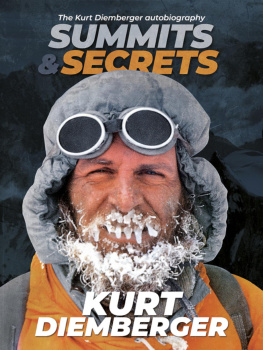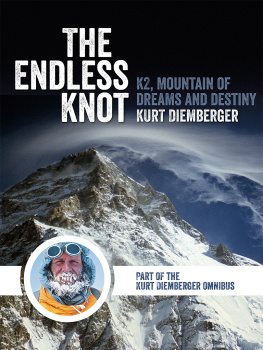When the first man in space caught sight of the earth, his first conclusion was that it really was round. He next observed that it was surrounded by a shimmering blue cloak, clearly defined against the darkness of the void. Not one of the many stars he could see, not the moon, nor the sun, flaming unnaturally there in the black sky, evinced this fairylike feature. Only the earth mans heaven.
Day and night succeeded one another swiftly. The speed of the flight was breath-taking, but the astronaut was not conscious of it. In the death-like silence, the earth turned beneath him. Now the strip of atmosphere stretched orange-red about the star, veiled in the darkness of night. Scarcely an hour later, cloud-banks were glittering in sunlight. What had become of time? It was with a sense of irony that the astronaut looked at the face of his watch; except for the capsule his only fixed point oceans and continents filed past down below. There were people down there whom he could not see, and those he loved were just as remote. All he knew was that they were thinking of him then there, under the blue glass-dome.
Someday, somebody, perhaps his great grandson, would fly still farther afield, right through the stars, traversing infinite distances away from the earth. He would know no more of nights and days. With him there would only be the stars, space and the fear of death.
What would be that mans thoughts? Must he not be oppressed merely by the idea of his immeasurable distance from the earth? Would he not live, out there among the myriads of the stars, in the sole hope of a safe return to it? To his earth which, for an inexplicable reason that lay in its very self, had created a paradise in the vast loneliness of space?
Our astronaut looked down again at the ever-receding earth. He too belonged to it; to the narrow, precarious space between zero and 8,000 metres, where man can live in which all the worlds miracles and all its bestialities are enacted the glittering skin of a drop of water.
Down there under the magic carpet of the clouds, men, were fighting and making love; in the loud din of war, tanks were roaring through the sands of the desert; ships sailed the seas and cities grew to being; here a mother was bringing her child to life, there a professor was cracking his head over the meaning of existence; forests rustled, and a young girl discovered that her breasts had started to form; and somewhere, somebody, cursing the whole world, died soon after. The earth kept on turning, and there was no end to love for human beings beneath the heavens who have always longed to go to where earth and sky meet.
And so they set out for the horizon, and climbed the highest peaks. Only wise men and lovers stayed where they were; but no one else understood why they had no need to go so far afield. Not even our astronaut, who had not climbed up to heaven, but burst through it, so that he was now outside, and could see the earth in all its limitations and space in all its infinity.
A turntable was racing round. There were children, holding hands, cutting capers, dancing in a ring, shouting, laughing, clapping, singing in unison with the loud-speaker: Little Marcello has gone up into space in his spaceship with a special mission, and is now happily breaking up the stars with his hammer. A roll of drums, and the stars splinter in the mirror above the gaily-hued pasteboard-box. Manfredo, aged just two, has fetched a chair and is looking on, entranced. Ancora! howl the others, for the record has run out; the little disc-jockey yes, he knows how plants the needle back at the beginning, and for the ninth time the bright-yellow cardboard ship mounts with Marcello to the sky. And the whirling dance goes on
Out here in space all is silence; the earth down there turns soundlessly. The man in the space-capsule knows that the moment for the descent is near down through the blue cloak of vapour, which protects the earth from death-dealing space. Meteors are quenched in it, so heavy is it; human beings can breathe and move in it, so light it is. The astronaut knows it: in a few minutes he will himself be hurtling through that sky like a meteor. Then the heat shield will begin to melt, the capsule itself may start to glow and he, will he be burnt to death?
Everything has been worked out to a hair; he will come down safely to earth.
But will he? Nobody knows. Downward tilts the capsule.
Who knows how many urgent prayers have risen to heaven while men were hurtling back through the atmosphere?
Prayers, yes but to what heaven? Where is that heaven?
The astronaut has landed safely on earth.
Suddenly, the first wave of the fhn burst upon the silence of the valley. We were on our way to look for crystals, in the night, and the storm howled around us, throwing wave upon shock wave into the vale.
The wind came from the south, roaring over the sub-alpine ridges, swirling far up to the Marmolatas crest, coursing in wild gusts among the pillars of the Drei Zinnen, and finishing by whistling the whole gamut of the scale among the ridges and towers of the Dolomites.
It was as if the whole sky had burst into turmoil, that March night. Was the storm ushering in the spring; in the night, of all things?
The white wall of the Hohe Tauern, confronting the warm southerly gale on its northward path, drove it high up into the sky. But it was not as easy as that to stop the snowgobbler, as these storms are called in the Salzburg dialect. True, its cloak of cloud, caught between the ice peaks tarried among the summits but the storm itself fell with undiminished fury upon the valleys to the north.
There, in the Salzach lowlands, the night-dark meadows stood starred with the first flowers; spring was already here.
Suddenly, the first wave of the fhn burst upon the silence of the valley.
We were on our way to look for crystals, and the storm was howling around us. Why had we come here by night?
One of the locals was responsible for that, telling us that he found crystals much more easily by night than by day: they blinked at him from far of in the light of his lantern, as he climbed the gullies in the steep slopes
The fhn threw wave upon shock wave into the vale. They came roaring down from somewhere high up among the glaciers, tearing through the forest, and hastening away from towards the Salzach.
We could see very little, here in the pitch-darkness of the lower Sulzbachtal, which rose, narrowly confined at this point by steep slopes, towards the Gross Venediger that silvery three-thousander rising above the broad glacier realm of the westerly Hohe Tauern. Even when a gap appeared in the black wall of the forest, we could only guess where the peak stood, high above the head of the valley.









